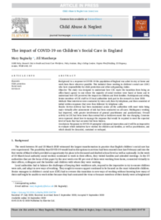

Displaying 431 - 440 of 1646
This article charts the UK history of contact in fostering and adoption as it relates to looked after children and their birth relatives. It builds on a recent publication in this journal by one of the authors based on her research on the use of social media by children in care.
The study was designed to understand how children’s social care (CSC) made the transition from being an office-based agency to one where the majority of social workers were based at home and to understand how CSC perceived the impact on children and their families.
"There has been slow but consistent growth in private foster care placements [in Ireland] and an increase in the number of companies in this market," writes Patrick Costello in this opinion piece for TheJournal.ie. "While these companies plug a gap in services, a gap that can leave children at risk, ultimately they lead to negative outcomes across the system," Costello argues.
This article from BBC News tells the story of Emily, a young woman whose 9 children were removed from her care, and the journey to ensuring that her 10th child remained in her care after she gave birth.
This discussion article describes a Child and Adolescent Mental Health Service (CAMHS) in the United Kingdom developed to meet the mental health needs of children and young people particularly those vulnerable children and young people at risk of actual or potential harm through child abuse and neglect, but may not be therapy ready.
According to this article from BBC News, the children's commissioner for England has called for a ban on placing under-18s in care in unregulated homes amid concerns over sexual and criminal exploitation.
This study’s objective was (1) to investigate if having parent(s) born outside of Europe has an additional effect on the risk of entry into out-of-home care (OHC) in cases of alleged parental physical violence against children, and (2) to discuss potential empirical support for the risk model and the bias model for explaining the over-representation.
The SOLID study aimed to investigate the feasibility of a definitive randomised controlled trial, comparing two behaviour change interventions to reduce risky substance use (illicit drugs and alcohol), and improve mental health, in young people in care.
"As an autistic care leaver, the hardest part of dealing with the Covid pandemic has been the neglect and lack of support I have experienced at my accommodation," writes Kerrie Portman in the Guardian.
In this short editorial, the organization New Beginnings shares the stories of three of the families they work with who have wanted to explain what lockdown has meant for them during this peculiar time.

